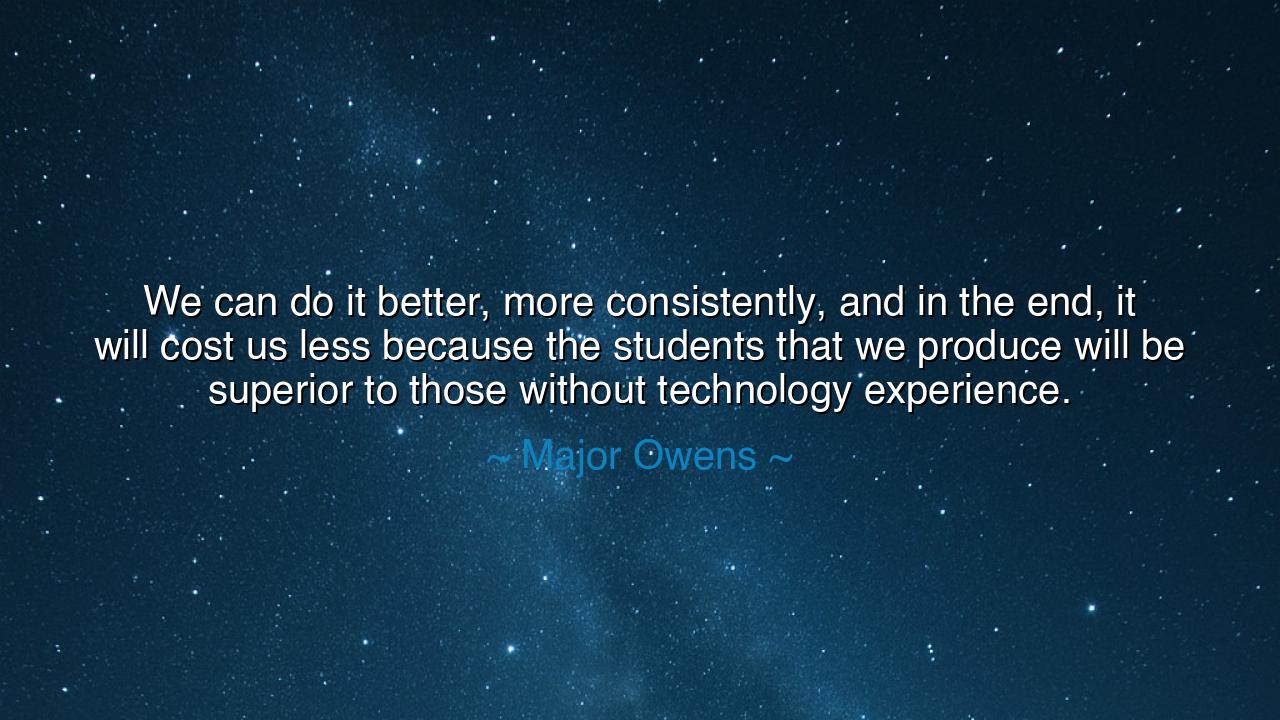
We can do it better, more consistently, and in the end, it will
We can do it better, more consistently, and in the end, it will cost us less because the students that we produce will be superior to those without technology experience.






Hear the words of Major Owens, spoken with foresight and urgency: “We can do it better, more consistently, and in the end, it will cost us less because the students that we produce will be superior to those without technology experience.” These words are not mere instruction, but a prophecy for all who labor in the fields of learning. They proclaim that the strength of a nation, the dignity of a people, and the destiny of generations lie not only in stone classrooms and parchment, but in the wise embrace of technology as a tool of empowerment.
In these words lies the recognition of a timeless truth: that the purpose of education is not simply to preserve knowledge, but to sharpen it, refine it, and equip the next generation for the challenges yet unseen. When Owens speaks of doing it better, he points to the ever-unfolding responsibility of teachers and leaders: to take the methods of old and improve upon them, to make learning not haphazard but consistent, not bound by chance but strengthened by new instruments. Just as the farmer who takes up the plow reaps more faithfully than the one who digs with bare hands, so too the educator who embraces new tools prepares students with greater strength.
Consider the story of the Industrial Revolution, when factories and machines changed forever the ways of labor. Those who resisted were left behind, clinging to fading crafts, while those who learned the new methods flourished. Yet the lesson was not only about industry, but about education itself: schools that adapted produced workers, engineers, and thinkers fit for the new world, while others fell into decline. In like fashion, Owens reminds us that in the age of technology, students untrained in its use are like soldiers sent to battle without armor.
But Owens does not speak only of efficiency or cost. He speaks of superiority—not in arrogance, but in capability. A student who understands both the wisdom of the past and the tools of the future is as an eagle with two strong wings, able to soar where others falter. Without technology experience, a student may be wise, but half-armed; with it, he is prepared to compete, to create, to lead. The true cost is not in the machines themselves, but in the lives diminished when opportunities are denied.
Yet take heed: Owens’ words are also a warning. For if education fails to adapt, the gap between those with access to technology and those without will widen into a chasm. And history shows us that such chasms breed unrest, inequality, and the weakening of entire nations. Just as Rome crumbled when it failed to renew its institutions, so too can a people falter if its youth are left behind in a world that demands skill, adaptability, and vision.
The lesson is thus clear: embrace progress, but with wisdom. Do not discard the old foundations of knowledge—discipline, memory, reasoning—but strengthen them with new instruments. Teachers must learn as eagerly as students, parents must encourage exploration, and communities must demand access for all. In this way, the rising generation will not merely survive the future, but master it.
In practice, this means seeking out learning wherever it may be found: in books and in circuits, in libraries and on screens. It means teaching children not only to read, but to code; not only to count, but to calculate with machines; not only to write, but to communicate across networks that span the earth. Each person, whether student or elder, must embrace lifelong learning, for the tools of tomorrow are born anew each day.
Thus the words of Major Owens resound as both exhortation and promise: we can do it better, if we choose consistency over neglect, foresight over complacency, and inclusion over exclusion. By preparing students with technology experience, we prepare not only individuals, but the strength of nations, the vitality of communities, and the hope of generations yet unborn. Let this truth be written not only on tablets of stone, but upon the living hearts of those who would lead the way into the future.






AAdministratorAdministrator
Welcome, honored guests. Please leave a comment, we will respond soon